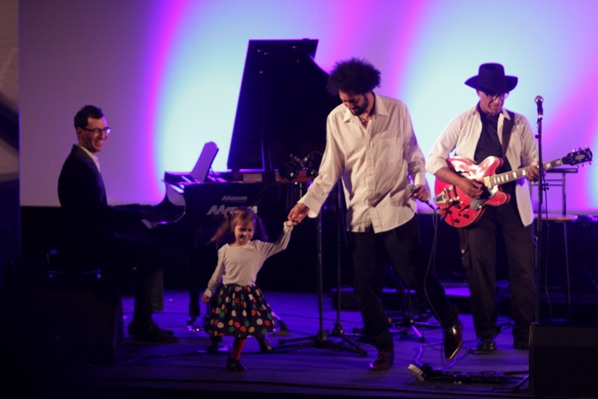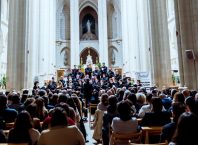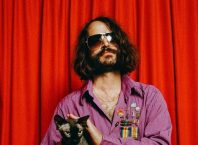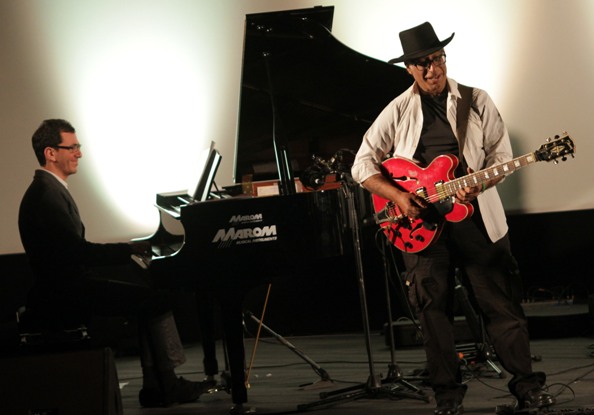
What happens when you take something familiar, the Mizrahi music that is part of the Israeli soundscape – on the radio, at a party, on TV and on the street, and take it somewhere else, merging Mizrahi and jazz? This past Thursday, February 23, 2012 at the Tel Aviv Jazz Festival, composer and pianist Omer Klein explored his Middle Eastern musical roots with new arrangements of Mizrahi songs, performing with Omer Avital on double bass and Itamar Doari on drums, with special guest Yehuda Keisar and guest vocalist Ravid Kahalani.
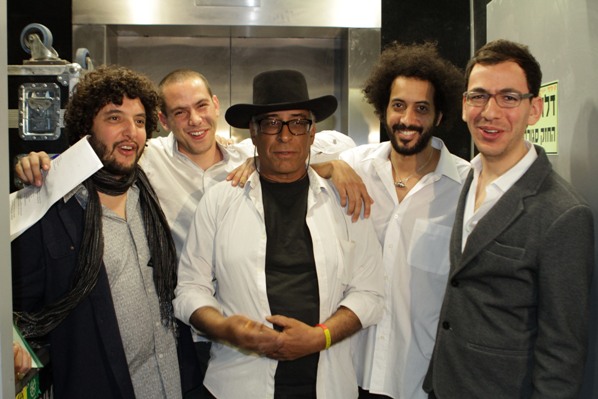
The “New Middle East” concert was initiated by festival artistic directors Barak Weiss and Asher Kesher. “I was in Germany,” recalled Klein, backstage after the concert, “and they said ‘listen, we have an idea.’ I said, sure it sounds great, but I’m not sure if we can work together. You know we jazz musicians are very open and flexible and often even great musicians from other genres are less open and flexible to try other things, and I wasn’t sure about Yehuda’s will even to give it a shot.”
A founding member of Tsililei HaOud in the 1970s, Yehuda Keisar’s guitar and his distinctive style have been at the heart of Mizrahi music as it emerged from the sidelines of Israeli culture, the “cassette music” of the Old Central Bus Station in Tel Aviv, to fill the most prestigious venue halls and hearts of Israel. Keisar has been a favorite guitarist of Mizrahi stars throughout the years: Ahuva Ozeri, Boaz Sharabi, Eyal Golan, Sarit Hadad, Zehava Ben, Jacky Mekayten, and many more. Yet Keisar is most closely associated with the late Zohar Argov, they played together from the early days, and Keisar’s guitar accompanied and supported Zohar throughout his brief, brilliant trajectory.
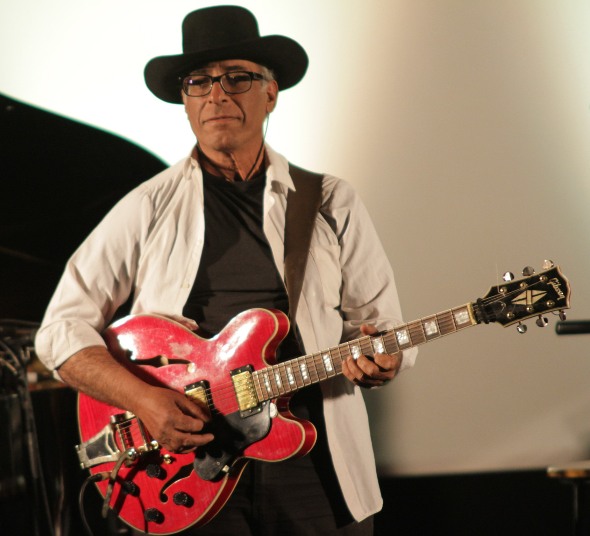
When Barak Weiss invited Keisar to perform at the jazz festival, the guitarist was surprised. “What have I got to do with jazz?” Keisar said, “I’ve been playing everything for forty years, but I’ve never played jazz.”
Moreover, Keisar confessed to feeling somewhat apprehensive about the encounter. “They are superstar musicians, all of them,” he said, “[I thought] I’m going to meet scholars, musicians who studied. I never studied a single note, I can’t read music.”
Omer Klein does indeed come from a very different musical background. “I was more interested in other things when I was growing up,” said Klein, “in more harmonically complex types of music, because I was trying to learn. Later on I figured that this music [Mizrahi] also means a lot in my musical personality because of the rhythms and the sounds are just meaningful to my experience as a man, I mean when I grew up it was all around me so I can’t shut it away. On the other hand my music is already not so far from this, at least on all of my records some of the tunes are inspired by Mizrahi music. On Introducing Omer Klein there is a song called Oud Song, and a song called Netanya – both of them, I wouldn’t have written them if I hadn’t heard Mizrahi music in my life, and in Rockets on the Balcony there is a tune called Baghdad Blues, so it was already a part of me, but I never kind of pushed it. This project was about pushing the envelope.”
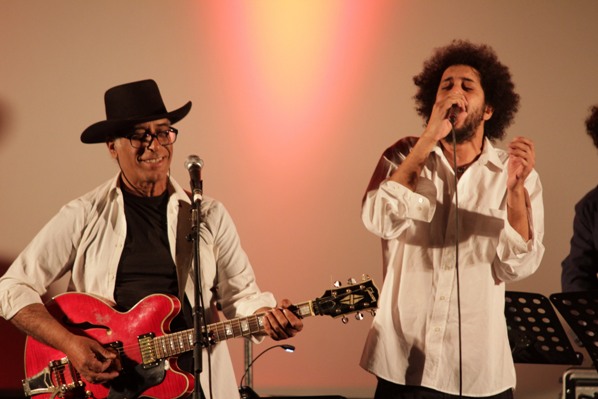
How then, did these two worlds meet? The scholar became a willing student.
“Working with Yehuda,” Klein said, “I had to learn the songs and learn his licks and his little things that he did on the records. So I was sitting with my iPod and earphones in my studio in Dusseldorf transcribing all this music and learning it, so it was really also a learning experience for me. One of the things I was grateful for…The thing was when you work with someone like Yehuda then you know that you have to work around him, meaning that you have to learn. Actually you are studying the person’s playing, that’s what I did from records. I studied how he plays and what he does. I watched YouTube videos to see what he does today, because in concerts often musicians improvise more than on the album, so I wanted to see how far can you stretch… I heard it and I got it, then I created arrangements that featured him and featured me and featured Omer and Itamar and Ravid in different aspects, but avoiding pushing Yehuda to a point that will make him feel uncomfortable. It was very important for me that the situation will be complemented by his skills which are immense.”

The evening was suffused with warmth and energy from the first notes of “Eizo Medina” (Hebrew: What a Nation) performed by Omer Klein, Omer Avital and Itamar Duari. When taking on the project, Klein knew that he only wanted do it with this constellation of musicians, with Omer Avital and Itamar Doari at the core. “Omer, Itamar and myself are very close,” he said, “both of them have worked with Ravid a lot, and I love Ravid’s singing so for me when I’m onstage and I’m looking at the bass player and it’s Omer or I’m looking at the percussionist and it’s Itamar, it’s already home. With Ravid and with Yehuda we had three rehearsals and become close. Rrom rehearsal to rehearsal we became more open. This atmosphere of intimacy started to grow and to be…yeah… and it was apparent to the audience.”
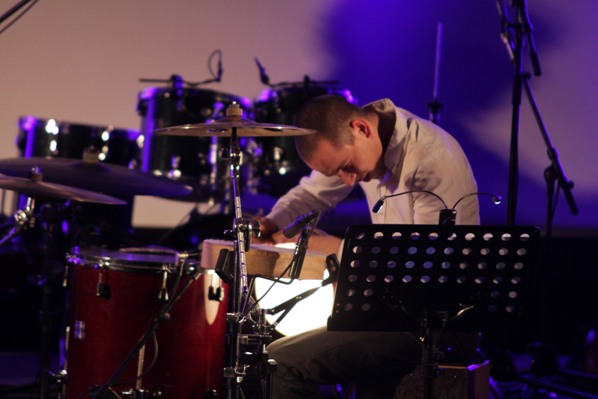
Eizo Medina, Kol Nedarai (All My Vows), Ahavat Hayaii (Love of My Life), Sod Hamazalot (The Zodiac Secret) with a guitar solo from Yehuda that rocked my world, wild and inspiring percussion from Doari on Hanna’leh Hitbalbelah (Hanna’leh Got Mixed Up), and some family fun as Ravid Kahalani was joined onstage by his sweet three year old, who’s got rhythm in her blood – it was an amazing concert. Onstage the chemistry between all the musicians was electrifying, there were no borders, there was just flow, love and music.
When Yehuda Keisar began to play the opening notes of Zohar Argov’s Badad (Alone – lyrics: Amishai Levin, music: Uzi Yahav), hearts opened and the audience sang with him. It was a moving experience for everyone, and most of all for Keisar. After the concert, recalling the moment, Keisar said, “It’s one of the songs I am known for, this song speaks to me…you know, I’ve also felt a little alone lately and I asked to play it tonight. I told the musicians, I want to do Badad, I want to feel good. I felt so close to the people tonight.”
How does Yehuda Keisar feel about his experience with jazz? “Wonderful,” he said, “it’s a new world for me. I opened up to new directions, now I’m looking for more. Music either comes from within you or not, it doesn’t matter whether or not you study music it depends on what you know how to express.”

